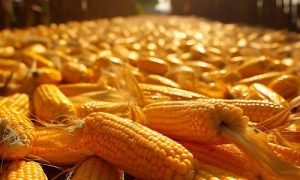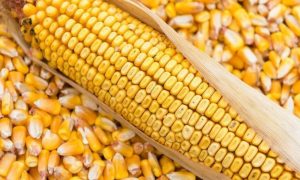The country has sufficient seed in stock to meetdemand: Cabinet

Cabinet received an update on maize and tobacco marketing, which was presented by the Minister of Lands, Agriculture,
Fisheries, Water and Rural Development, Honourable Dr Anxious Jongwe Masuka.
The nation is informed that as at December 10, 2023, the Grain Marketing Board had in stock a total of 235 095 tonnes of
grain, comprising 188 353 tonnes of maize and 46 742 tonnes of traditional grains. At the prevailing monthly
consumption rate of 23 000 tonnes per month, the available grain will last 10.2 months.
Regarding wheat, the country’s current stocks stand at 242 508 tonnes, which are sufficient to provide 11.5 months
cover at a monthly drawdown rate of 21 000 tonnes.
Cabinet highlights that the GMB has a 46,8 percent market share of maize, 7,3 percent of soya bean, 41,3 percent
sunflower, wheat 46 percent, 63,6 percent of traditional grains, translating to 39,4 percent share of the total marketed
crop. A total of 313 719 tonnes, comprising 186 341 tonnes of maize, 121 549 tonnes of wheat and 5 829 tonnes of
wheat flour were imported by the private sector between April 1 and December 3, 2023. A cumulative 1 710,0 tonnes of
maize at an average price of US$310 per tonne, 262,98 tonnes of soya beans at an average price of US$500 per tonne,
and 234,82 tonnes of wheat at an average price of US$400 per tonne have been marketed through the Zimbabwe
Mercantile Exchange (ZMX). A total of 31 warehouses have been registered under the Warehouse Receipt System.
On tobacco marketing, the nation is informed that 227,5 million kilogrammes of tobacco worth US$1,196 billion have
been exported at an average price of US$5,26 per kg. In comparison, 182 million kilogrammes worth US$880,677 million
were exported during the same period last year at US$4,83 per kg.
Meanwhile, a total of 85,295 tonnes of graded cotton have been delivered across the nation as at December 6, 2023,
compared to 55,927 tonnes at the same time in 2022. COTTCO has received 69,419 tonnes of seed cotton so far.
UPDATE ON THE 2023/2024 SUMMER CROPPING SEASON
Cabinet adopted the update on the 2023/2024 summer cropping season, as presented by the Minister of Lands,
Agriculture, Fisheries, Water and Rural Development, Hon. Dr Anxious Jongwe Masuka.
The Government highlights that rainfall is expected throughout the country during the course of the week. Farmers are
therefore advised that the rainfall season has started and is likely to be short.
A total of 2 877 000 hectares is targeted to be planted to summer crops this season as follows:
Maize, 1 782 000 hectares; Sorghum, 350 000 hectares; Pearl millet, 200 000 hectares;
Soya beans, 60 000 hectares;
Sunflower, 160 000 hectares;
Sugar beans, 55 000 hectares; and
Cotton, 270 000 hectares.
Of the total hectarage, 867 500 hectares will be financed by the Climate Proofed Presidential Inputs Supply Scheme
(Pfumvudza/Intwasa), and the rest by CBZ, AFC, NMB and other banks; and by the private sector and individual farmers.
As at December 10, 2023 and due to late commencement of the rainfall season, about 95 156 hectares had been
planted, compared to 465 707 hectares at the same time last year.
The country has sufficient seed in stock to meet demand, with 40,8 percent of the available maize seed being of the
early to ultra-early maturity varieties. Significant progress has been recorded in farmer training and in the preparation of
Pfumvudza/Intwasa plots. Farmers have generally reacted positively to climate-proofing interventions during this El
Nino year, with 87 percent of the targeted 11.85 million plots having been prepared.
In terms of livestock Government has instituted immediate remedial measures including borehole drilling, hay bailing
and enhanced disease management, to alleviate the poor livestock condition in the drier provinces. The worst affected
provinces are Matabeleland South, Matabeleland North and Masvingo.
SITUATION
Cabinet noted the Update on the Country’s Water, Sanitation and Hygiene Situation, which was presented by the
Minister of Lands, Agriculture, Fisheries, Water and Rural Development, Hon. Dr Anxious Jongwe Masuka, as the
Chairman of the National Action Committee on Water, Sanitation and Hygiene (WASH).
The public is informed that the WASH National Action Committee superintends over the subcommittees of Rural WASH,
Urban WASH and Water Resources Management. In order to engender a whole-of-society approach to sector
programming, a WASH Sector Working Group brings together Government, donors, development partners, civil society
organisations, the private sector and the media.
According to the latest Zimbabwe Vulnerability Assessment Committee (ZimVAC) Rural Livelihood Report, access to
improved drinking water has increased from 72 percent in 2020 to 78,4 percent in 2023, and access to basic water
services also correspondingly rose from 57 percent to 60,3 percent. Seventy-six percent of boreholes and deep wells in
rural areas are functional.
Cabinet notes that open defecation has fallen from 30 percent in 2020 to 28,6 percent in 2023, despite access to
improved sanitation having fallen from 65 percent to 61,1 percent. Government is putting in place measures to address
the low basic hygiene (that is handwashing with soap and safe water) in both rural and urban areas. Measures are also
being instituted to address general WASH sector challenges, such as aged and dilapidated infrastructure and inadequate
financing.
In terms of water security, Cabinet notes that while dam storage levels continue to decline due to the delayed onset of
rains, the current national storage level of 74,4 percent is, nonetheless, higher than the 54,4 percent expected at this
time of the year.
There has been increased electricity supply resulting in ZINWA’s pumping stations’ capacity increasing to 68 percent
during November 2023.
Source Link :- https://www.herald.co.zw/the-country-has-sufficient-seed-in-stock-to-meet-demand-cabinet/

















